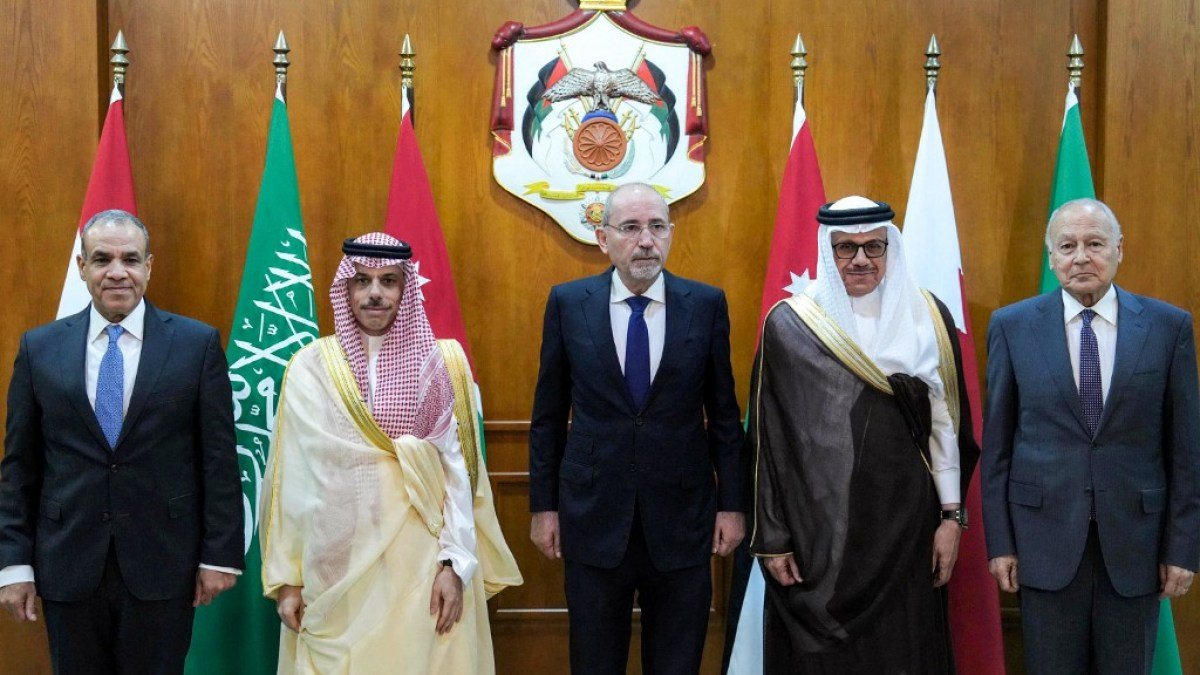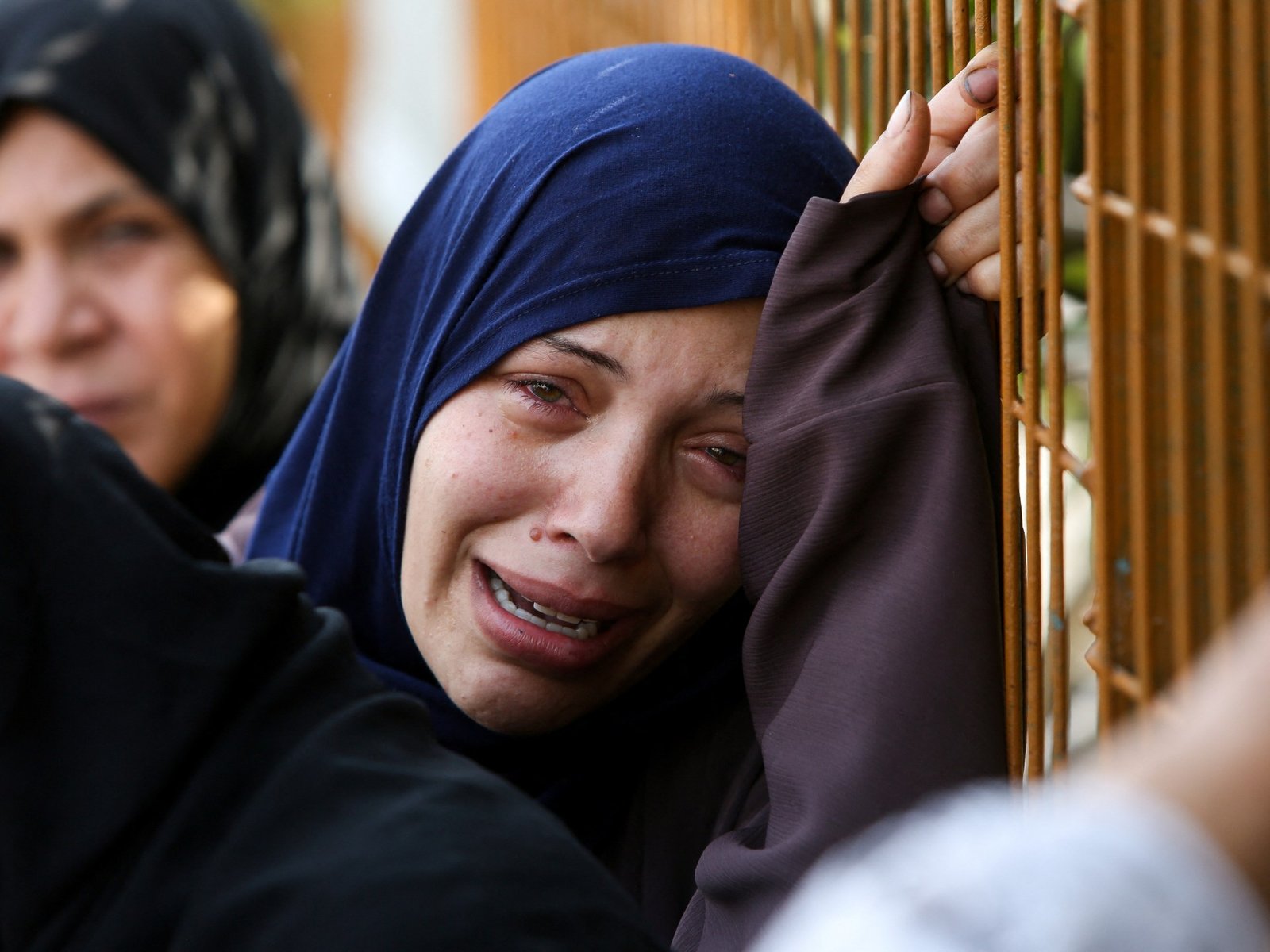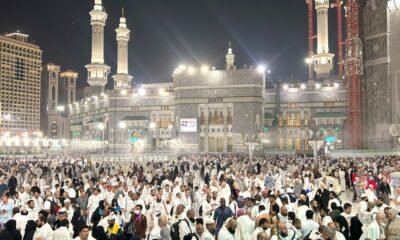Middle East
Mahmoud Khalil, student leader of Columbia protests, arrested | Israel-Palestine conflict News

United States Immigration and Customs Enforcement agents (ICE) have arrested a Palestinian graduate student who played a prominent role in last year’s pro-Palestinian protests at New York’s Columbia University, the student workers’ union said on Sunday.
The student, Mahmoud Khalil at the university’s School of International and Public Affairs, was arrested at his university residence on Saturday, the Student Workers of Columbia union said in a statement.
Khalil’s wife is a US citizen and he has a permanent residency green card, the union said. He remained in detention on Sunday. Khalil’s wife declined to comment through one of Khalil’s fellow students.
Khalil’s lawyer, Amy Greer, told the Associated Press news agency that she spoke by phone with one of the ICE agents during the arrest, who said they were acting on State Department orders to revoke Khalil’s student visa. Informed by the lawyer that Khalil was in the country as a permanent resident with a green card, the agent said they were revoking that too, according to the lawyer.
Greer said the authorities declined to tell Khalil’s wife, who is eight months pregnant, whether he was accused of committing a crime. Khalil has since been transferred to an immigration detention facility in Elizabeth, New Jersey.
“We have not been able to get any more details about why he is being detained,” Greer told the AP. “This is a clear escalation. The administration is following through on its threats.”
The arrest appeared to be among the first known actions under President Donald Trump’s pledge to deport international students who joined the protests against Israel’s war in Gaza that swept college campuses last year. His administration has claimed participants forfeited their rights to remain in the country by supporting Hamas, which is designated as a ‘terror’ organisation by the US.
The move has been described as an attack on First Amendment freedoms.
Khalil, an Algerian citizen of Palestinian origin, has been one of the school administrators’ lead negotiators of the pro-Palestinian student protesters, some of whom set up a tent encampment on a Columbia lawn last year and seized control of an academic building for several hours in April before police entered the campus to arrest them. Khalil was not in the group that occupied the building but was a mediator between Columbia provosts and the protesters.
The protesting students called for Columbia’s divestment from companies with ties to Israel, a ceasefire and an end to the war that killed nearly 50,000 Palestinians and turned the enclave into rubble after nonstop bombardment. The US provided the bulk of the ammunition for the war.

Columbia said last year that it would consider expediting some of the students’ demands through its investments committee.
Rights groups have accused Israel of committing genocide in Gaza – home to 2.3 million people. Despite a ceasefire in place since January 19, Israel has blocked the entry of any aid into Gaza since March 1, drawing condemnation from rights groups and aid agencies.
The October 7, 2023, Hamas attack on Israel and subsequent Israeli military offensive on Gaza led to months of pro-Palestinian protests that roiled US college campuses.
At least 1,100 people were killed in the Hamas attack and some 240 people were taken captive. Most of the captives have been released as part of truce deals. A new round of truce talks will resume in the Qatari capital, Doha, on Monday.
Targeted by the government
A spokesperson for Columbia said the school was barred by law from sharing information about individual students.
The Department of Homeland Security and the State Department, which oversees the country’s visa system, did not respond to questions from the news agencies. It was not immediately clear on what grounds ICE agents arrested Khalil. The ICE comes under the US Department of Homeland Security.
In an interview with the Reuters news agency a few hours before his arrest on Saturday about the Trump administration’s criticism of Columbia, Khalil said he was concerned that he was being targeted by the government for speaking to the media.
The Trump administration on Friday said it had cancelled government contracts and grants worth about $400m to Columbia University. The government said the cuts and the student deportation efforts are due to “anti-Semitic” harassment at and near Columbia’s Manhattan campus.
“What more can Columbia do to appease Congress or the government now?” Khalil said before his arrest, noting that Columbia had twice called in police to arrest protesters and had disciplined many pro-Palestinian students and staff, suspending some.
“They basically silenced anyone supporting Palestine on campus and this was not enough. Clearly, Trump is using the protesters as a scapegoat for his wider agenda [of] fighting and attacking higher education and the Ivy League education system.”
In response to the announced grant cuts on Friday, Columbia’s interim president, Katrina Armstrong, said the school was committed to combating anti-Semitism and was “working with the federal government to address their legitimate concerns”.
Protesting students have denied the charges of anti-Semitism.
‘This is only the beginning’
Maryam Alwan, a Palestinian American senior at Columbia who has protested alongside Khalil, said the Trump administration was dehumanising Palestinians.
“I am horrified for my dear friend Mahmoud, who is a legal resident, and I am horrified that this is only the beginning,” she said.
US Secretary of State Marco Rubio said last week that international students who support Hamas, which the US has designated a “terrorist” organisation, face visa revocation and deportation.
On Thursday, Columbia issued a revised protocol for how students and school staff should handle ICE agents seeking to enter private school property.
The school said ICE agents without a judicial arrest warrant may be allowed to enter its private property in “exigent circumstances”, which it did not specify.
“By allowing ICE on campus, Columbia is surrendering to the Trump administration’s assault on universities across the country and sacrificing international students to protect its finances,” the Student Workers of Columbia said in its statement.
Khalil lives in a university apartment building near Columbia’s main gated campus.
Middle East
Saudi Arabia calls Israel barring Arab ministers West Bank trip ‘extremism’ | Israel-Palestine conflict News

Foreign ministers from Egypt, Jordan, Qatar, Saudi Arabia, and the UAE had planned the visit to discuss Palestinian statehood and end to war on Gaza.
Saudi Arabia has accused Israel of “extremism and rejection of peace” after it blocked a planned visit by Arab foreign ministers to the occupied West Bank.
Saudi Foreign Minister Prince Faisal bin Farhan Al Saud made the remarks during a joint news conference in Jordan’s capital, Amman, on Sunday with his counterparts from Jordan, Egypt, and Bahrain.
“Israel’s refusal of the committee’s visit to the West Bank embodies and confirms its extremism and refusal of any serious attempts for [a] peaceful pathway … It strengthens our will to double our diplomatic efforts within the international community to face this arrogance,” Prince Faisal said.
His comments followed Israel’s decision to block the Arab delegation from reaching Ramallah, where they were set to meet Palestinian President Mahmoud Abbas. The ministers from Egypt, Jordan, Qatar, Saudi Arabia, and the United Arab Emirates (UAE) had planned the visit as part of efforts to support Palestinian diplomacy amid Israel’s ongoing war on Gaza.
Israel controls the airspace and borders of the West Bank, and on Friday announced it would not grant permission for the visit.
“The Palestinian Authority – which to this day refuses to condemn the October 7 massacre – intended to host in Ramallah a provocative meeting of foreign ministers from Arab countries to discuss the promotion of the establishment of a Palestinian state,” an Israeli official had said, adding that Israel will “not cooperate” with the visit.
Prince Faisal’s trip to the West Bank would have marked the first such visit by a top Saudi official in recent memory.
Jordan’s Foreign Minister Ayman Safadi said blocking the trip was another example of how Israel was “killing any chance of a just and comprehensive” Arab-Israeli settlement.
An international conference, co-chaired by France and Saudi Arabia, is due to be held in New York from June 17 to 20 to discuss the issue of Palestinian statehood.
Egyptian Foreign Minister Badr Abdelatty said the conference would cover security arrangements after a ceasefire in Gaza and reconstruction plans to ensure Palestinians would remain on their land and foil any Israeli plans to evict them.
Israel has come under increasing pressure from the United Nations and European countries, which favour a two-state solution to the Israeli-Palestinian conflict, under which an independent Palestinian state would exist alongside Israel.
Middle East
Why Hamas is seeking to change the US-proposed Gaza ceasefire deal | Gaza

Palestinian group Hamas claims a recent ceasefire proposal passed to them by United States special envoy Steve Witkoff is different from one they had agreed to a week earlier.
Basem Naim, a leading Hamas official, told Al Jazeera on Saturday that the group “responded positively” to the latest proposal relayed by Witkoff, even though it offered “no guarantees to end the war”, according to Naim.
Israel has killed more than 54,000 Palestinians since October 2023, and its total aid blockade since March has caused starvation and a famine-like situation in Gaza, home to 2.3 million people, most of whom were displaced by 19 months of relentless bombardment.
Amid international pressure, Israel has allowed a trickle of aid into Gaza, which has been described as a “drop in an ocean” by humanitarian groups.
Here’s what you need to know about the ceasefire proposal.

Did Hamas reject the ceasefire proposal?
According to the group, no.
It says it responded positively but added a few key provisions.
What are the key points in Hamas’s proposal?
There are a few.
Hamas has responded to the latest US-proposed ceasefire with demands for a pathway to a permanent ceasefire, instead of a temporary one where the Israeli government could unilaterally restart hostilities as they did in March.
They have also called for a full withdrawal of Israeli forces from the Gaza Strip and the resumption of aid and assistance to the besieged area.

What are the key differences in this proposal and the one Witkoff relayed to Hamas?
Witkoff proposed a 60-day pause in hostilities. After that, the parties (Israel and Hamas) would work to agree to extend the pause.
The issue with this is that the last time it happened, Israel unilaterally decided to cut aid to Gaza and started bombing it. To avoid a similar scenario, Hamas has tried to negotiate on the timeline for releasing the captives, 10 of them alive and 18 bodies of those killed during the war. Witkoff’s proposal called for the release to take place within a week of the 60-day pause.
However, Hamas fears Israel will resume its bombing campaign upon the release of the captives, so it has called for staggering their release throughout the pause.
It has called for a set list of negotiation topics to avoid what has happened in past negotiations with Israel, where Prime Minister Benjamin Netanyahu added provisions in what critics say was an attempt to derail talks and prolong the war.
According to the website Drop Site News, Hamas also reinserted a provision from the May 25 agreement that Israel had withdrawn.
That provision would be for Hamas to hand over the governing of Gaza to “an independent technocratic committee”.

What is the US reaction to Hamas’s additions?
Witkoff called Hamas’s response “totally unacceptable” and said it “only takes us backward”.
“Hamas should accept the framework proposal we put forward as the basis for proximity talks, which we can begin immediately this coming week,” he wrote on X, formerly Twitter.
“That is the only way we can close a 60-day ceasefire deal in the coming days in which half of the living hostages and half of those who are deceased will come home to their families and in which we can have at the proximity talks substantive negotiations in good-faith to try to reach a permanent ceasefire.”
I received the Hamas response to the United States’ proposal. It is totally unacceptable and only takes us backward.
Hamas should accept the framework proposal we put forward as the basis for proximity talks, which we can begin immediately this coming week.
That is the only…
— Office of the Special Envoy to the Middle East (@SE_MiddleEast) May 31, 2025
US President Donald Trump previously said the two sides were nearing a deal.
What is Israel saying?
The US and Israel seem to be in agreement on the terms.
Israel claims its officials agreed with the US proposal for a 60-day ceasefire.
White House press secretary Karoline Leavitt said Israel “backed and supported” the new proposal.
Netanyahu criticised the Hamas response, parroting Witkoff and laying the blame on the Palestinian group for failing to accept the proposal.

“As Witkoff said, Hamas’s response is unacceptable and sets the situation back. Israel will continue its action for the return of our hostages and the defeat of Hamas,” Netanyahu said.
If the US and Israel agree, why is Hamas holding out?
Hamas is wary of past instances where Israel chose to unilaterally break the ceasefire. That happened in March, when Netanyahu decided to block all aid from entering Gaza and restart the war.
Tamer Qarmout, an associate professor at the Doha Institute for Graduate Studies, described the negotiations between Hamas and Israel as taking place with “no good faith whatsoever”.
“They [Israel] are fixated on one key goal, which is Hamas’s capitulation and surrender, and disappearing from the scene,” Qarmout told Al Jazeera.
“Hamas is engaged in these negotiations just to try to reduce the horrors of the war, to allow some humanitarian aid to enter and to also look for a dignified exit. No one in Hamas wants to see themselves surrendering this way.”
What happens now?
In the interim, Israel is continuing to attack Gaza.
On Sunday, Israeli forces opened fire on Palestinians who had gathered at aid distribution sites run by a US-backed group, Gaza Humanitarian Foundation, in southern and central Gaza. At least 31 people were killed in Rafah and another near the Netzarim Corridor.
Meanwhile, residential homes across Gaza are still being bombed relentlessly.

Middle East
Israel kills 32 Palestinians waiting for food at US-backed Gaza aid sites | Israel-Palestine conflict News

Israel has killed at least 32 Palestinians waiting to get food at two aid distribution sites in Gaza, leaving more than 200 others injured.
Israeli tanks opened fire on thousands of civilians gathered at a distribution site in southern Gaza’s Rafah on Sunday morning, killing at least 31 people, according to Gaza’s Government Media Office.
Soon after, another person was killed in a shooting at a similar distribution point south of the Netzarim Corridor in Gaza City, said the office’s statement on Telegram.

The aid is being distributed by Gaza Humanitarian Foundation (GHF), a controversial group backed by Israel and the United States, which has completed a chaotic first week of operations in the enclave.
The United Nations and other aid groups have refused to cooperate with the GHF, accusing it of lacking neutrality and suggesting the group has been formed to enable Israel to achieve its stated military objective of taking over all of Gaza.
‘Killed for seeking one meal for children’
Ibrahim Abu Saoud, who witnessed the attack on aid seekers in Rafah, told The Associated Press news agency that Israeli forces opened fire on people as they moved towards the distribution point.
Abu Saoud, 40, said the crowd was about 300 metres (328 yards) away from the military. He said he saw many people with gunshot wounds, including a young man who died at the scene.
“We weren’t able to help him,” he said.
Al Jazeera’s Hind Khoudary, reporting from Deir el-Balah in central Gaza, said Palestinians are being killed while trying to secure “one meal for their children”.
“This is why Palestinians have been going to these distribution points, despite the fact that they know that they are controversial. They [distribution points] are backed by the US and Israel, but they do not have any other option,” she said.
“[Even] the food parcels that were distributed to Palestinians are barely enough. We are talking about one kilo of flour, a couple of bags of pasta, a couple of cans of fava beans – and it’s not nutritious. It’s not enough for a family in Gaza nowadays.”
The GHF told the AP that Israeli soldiers fired “warning shots” as Palestinians gathered to receive food. The group denied reports that dozens of people were killed, describing them as “false reporting about deaths, mass injuries and chaos”.
The Israeli army said in a statement on the Telegram messaging app that it was “currently unaware of injuries caused by [Israeli] fire within the humanitarian aid distribution site” and that the incident was still under review.
The Government Media Office in Gaza condemned the attacks, describing the GHF’s distribution points as “mass death traps, not humanitarian relief points”.
“We confirm to the entire world that what is happening is a systematic and malicious use of aid as a tool of war, employed to blackmail starving civilians and forcibly gather them in exposed killing points, managed and monitored by the occupation army and funded and politically covered by … the US administration,” it said in a statement.
Speaking from Gaza City, Bassam Zaqout of the Palestinian Medical Relief Society said the current aid distribution mechanism had replaced 400 former distribution points with just four.
“I think there are different hidden agendas in this aid distribution mechanism,” he told Al Jazeera. “The mechanism does not cater to the needs of the people, such as the elderly and people with disabilities.”
Palestinian group Hamas, which runs the enclave’s government, released a statement, saying the Israeli shootings were a “blatant confirmation of premeditated intent” as it held Israel and the US fully responsible for the killings.
The Popular Front for the Liberation of Palestine (PFLP) said the killings were a “full-fledged war crime” and demanded international intervention to “stop this ongoing massacre and impose strict accountability mechanisms”.
Sunday’s killings capped a deadly first week for the project’s operations, coming on the back of two earlier shootings at two distribution points in the south – the first in Rafah, the second west of the city – which saw a combined total of nine Palestinians killed.
In Gaza, crucial aid is only trickling in after Israel partially lifted a more than two-month total blockade, which brought more than two million of its starving residents to the brink of a famine.
-

 Africa4 days ago
Africa4 days agoSurvivor of Liverpool car ramming talks of shock and panic
-

 Sports3 days ago
Sports3 days agoThe Knicks are bringing hope and title dreams back to New York after years in the doldrums
-

 Lifestyle3 days ago
Lifestyle3 days agoChildren and careers: Talking to kids about what they want to be when they grow up
-

 Lifestyle4 days ago
Lifestyle4 days agoHow to decorate a patio, balcony or other small outdoor space
-

 Lifestyle4 days ago
Lifestyle4 days agoFaizan Zaki hopes to go from spelling bee runner-up to champ
-

 Middle East5 days ago
Middle East5 days agoHajj pilgrimage in Saudi Arabia to begin on June 4 | Religion News
-

 Lifestyle4 days ago
Lifestyle4 days agoA guide to navigating tariffs if you’re planning a wedding
-

 Asia3 days ago
Asia3 days agoShangri-La Dialogue: China snubs Asia’s largest defense forum as tensions with US simmer




